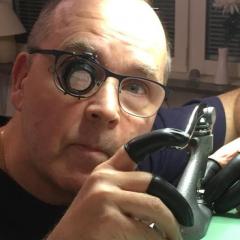-
Recently Browsing
- No registered users viewing this page.
-
Topics
-
Posts
-
By Neverenoughwatches · Posted
Instead of using tweezers, put a piece of rodico onto a toothpick or pegwood. Then set your spring to the rodico, this way the spring is not under any tension when floating it back into the bloc. As you bump into the bloc when trying to find the entrance the rodico will give but still holds onto the spring ie. You wont have the rigidity of tweezers. -
By Neverenoughwatches · Posted
If frank says these bombè jewels are for balances and similar pivots then they are used cupped side facing the pivot and then capped i assume. In Nicklesilver's reply i guess that cup can also be reversed and used as an oil reservoir leaving the shoulder riding on a less frictioned domed surface. 🤷♂️ Hence the use of them on wheels closer to the escapement that have less torque requiring efforts to reduce friction and are also uncapped. -
By Neverenoughwatches · Posted
Looks that way, if it had any amount of significant jewel count it would say so on the dial. Looks that way, if it had any amount of significant jewel count it would say so on the dial. Same answer as Mike regarding the dial, its often just a slapped on name of a retailer but i thought you were way above this understanding Pete ? -
By Neverenoughwatches · Posted
Light naptha is what you need to be looking for. The carbon to hydrogen ratio is high with heavy naptha, it doesn't evaporate as well as light naptha and is prone to leaving more residue. Try tom's suggestion of the mirror test. -
By Neverenoughwatches · Posted
Its a big item Michael and a lot that could go wrong with the process of getting it to its new location. I once helped install one of these units into a conservatory that i had built. It was big and bloody heavy and took six of us to get it in safely. If you have sliding doors and you need to remove the whole frame then that may or may not go well. But i would advise getting a professional in if you have little knowledge on the installation of them. The glazing of the doors could well be 6mm laminated glass which again will be heavy very heavy if the glazing units are big. The glass would also need to be set up and packed correctly to open the doors properly more so if they are unframed and the sliders are upvc. Seems a shame but if no one is biting and that may be due to having no warranty i guess the only takers might be someone that installs them for a living and knows how to repair. If its fibreglass just be careful, i sometimes have to cut fibreglass baths out and they are nasty to work with . Thick gloves are definitely recommended, not fun picking out fibreglass spells two days later that have started to go septic. Good luck with it all matey.
-








Recommended Posts